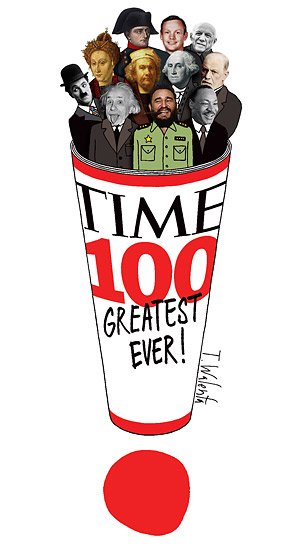
I'm sure you'll learn a lot of things by reading the TIME 100. Shallow things about this brief moment in history, but, still, things. But some of you — the intellectuals, the strivers, let's face it, the 1% — will be less interested in the 100 most influential people right now and more interested in the list I've put together of the 100 most influential people in history. The All-Time TIME 100 of All Time™ is a list designed not just to make you think, like the regular TIME 100, or even to make you think about thinking, like you thought I was going to say, but to make you think about how smart I am.
To make the All-Time TIME 100 of All Time™ list, I followed several rules that seem to govern the TIME 100. There had to be a lot more Americans than is historically warranted, I had to pile on as many minorities and women as possible, and I had to prove that some influential people are attractive movie stars. Also, I had to contact a brain trust of experts so that I could point to them if questioned about any of my choices.
The first expert I called was James Lipton, host of Bravo's Inside the Actors Studio. Normally, when conducting an interview, you have to ask at least one question, but Lipton started with Euripides and kept talking for 45 minutes. He confidently eliminated whole swaths of history, saying things like, "The Romans don't make it for me." Along with picking Shakespeare, Mozart and Beethoven, Lipton had some surprising choices, such as George Balanchine and Stephen Sondheim. For actors he chose Edmund Kean and Charlie Chaplin. Then he said, "For a 20th century actor, should we say it together? One, two, three..." I said, "Brando!" while he said "Brahhhhhndo." I never nail that say-it-at-the-same-time thing. At least this time I didn't blurt out, "I love you." Though I almost did.
Lipton's list was great, but it was full of white men. For help I called Cornel West, a professor at Princeton's Center for African-American Studies and author of Brother West: Living and Loving Out Loud, but the voice mail he left me was less list-broadening than I'd hoped. "Brother Joel Stein, hope you're staying strong," he said. "Don't forget St. Francis of Assisi and Martin Luther King Jr. Definitely Chekhov. I'd say John Coltrane." Then he tried to come up with some women: "I wish it were Toni Morrison. I'd probably say Antigone, but she's not for real." One thing was clear: Cornel West will never host Inside the Actors Studio.
When I asked historian Douglas Brinkley for a bunch of Americans I could plausibly shove on the All-Time TIME 100 of All Time™, he started pouring them out: George Washington, Abraham Lincoln, Thomas Edison, Walt Whitman, Elvis Presley, the Wright Brothers, Neil Armstrong. He was really good at this. He told me that was because he was writing a preface for a book about the 100 most influential people in history. A book being put out by TIME.
I couldn't believe that TIME's books division was brazenly trying to steal my totally original All-Time TIME 100 of All Time™ idea. So I called Steve Koepp, my old editor, who now supervises TIME books, and asked him whether, after nine years, TIME had run out of ways to exploit the TIME 100 or I had run out of ways to make fun of it. Before we could figure that out, we started comparing our lists. The All-Time TIME 100 of All Time™ (which you can read at time.com/joelslist) was so obviously better. His list contained just three people whose last name was "the Great." Mine has 15. I'm pretty sure that if someone gets called the Great, it's for a reason, like that they're great. His list has no actors, while mine has four, and he doesn't have a single celebrity chef. And disastrously, he doesn't have anyone who became famous in this millennium, whereas I have Mark Zuckerberg, which greatly increases the odds of my list being posted all over Facebook.
While I was in the midst of mocking him (Abraham wasn't a real person! Ashoka the Great was no Akbar the Great! You didn't talk to James Lipton!), Koepp told me his list wasn't finalized and he'd take mine into consideration. Plus I could write one of the entries. As I worked on the Nietzsche page, I realized that the TIME 100 is less a silly gimmick than a wonderful intellectual parlor game, which is a phrase I've heard the editors of TIME use since 1999 and which I have used to make fun of the editors of TIME since 1999. But now that I've finally been included, I am way into intellectual parlor games. I can't wait to be invited to more of them. Maybe a night of six degrees of Bernard-Henri Lévy or an appearance in a Ken Burns documentary. I can't believe I ever made fun of these lists in the first place.